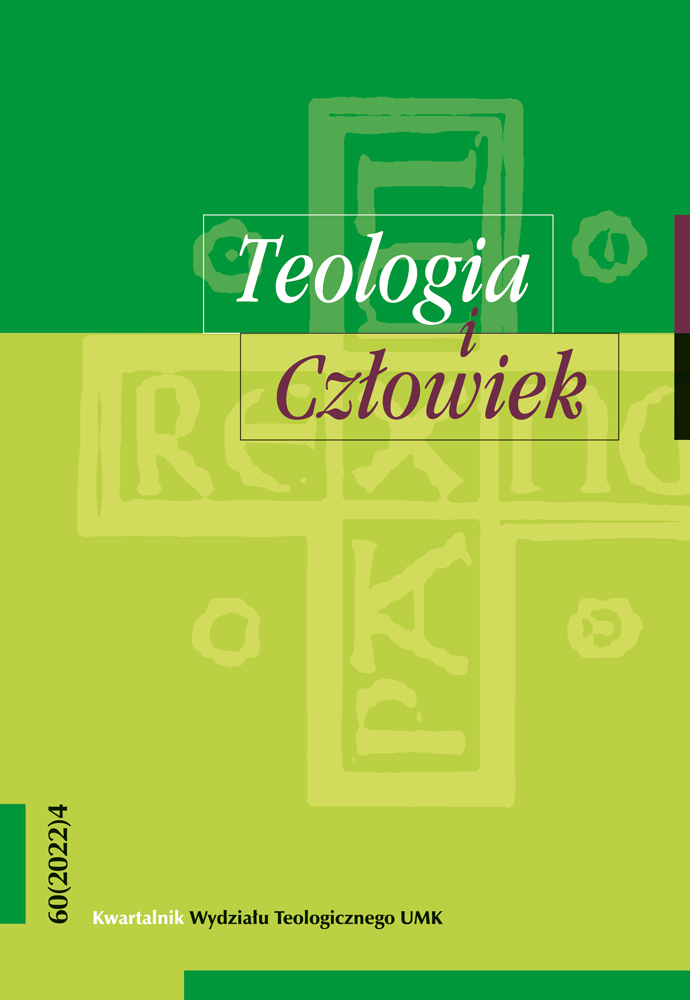Cel Eucharystii w ujęciu teologii liturgicznej
DOI:
https://doi.org/10.12775/TiCz.2022.026Słowa kluczowe
Eucharystia , cel Eucharystii , teologia liturgicznaAbstrakt
Różnorodności wymiarów Eucharystii zasadza się różnorodność pojmowania celu Eucharystii. Głównym problemem badawczym tego opracowania jest udzielenie odpowiedzi na pytanie o cel ustanowienia przez Chrystusa i sprawowania przez Chrystusa i przez Kościół Eucharystii. Polem badawczym jest tu teologia liturgiczna, która łączy w sobie zbawcze misterium Chrystusa, jego celebrację i życie chrześcijańskie. Łączność ta jest pierwszym wspólnym mianownikiem, dla różnych ujęć teologii liturgicznej, wskazującym na celowość Eucharystii. Taki cel Eucharystii najmocniej akcentuje szkoła rzymska teologii liturgicznej. U podstaw różnych szkół teologii liturgicznej znajdują się dwaj teologowie chrześcijańskiego Wschodu, Alexander Schmemann i Jean Corbon, dla których głównym celem Eucharystii jest celebracja nieustannego objawiania się i udzielania się Boga, co sprawia, że Eucharystia jest nieustannym zanurzaniem codzienności w eschatologii. Celem Eucharystii w ujęciu amerykańskiej teologii liturgicznej jest nieustanne formowanie jej uczestników jako kościelnej wspólnoty kapłanów stworzenia, zjednoczonych z Chrystusem i działających jego mocą. Wszyscy ci teologowie pomimo różnic akcentują szczególny sposób budowania przez Eucharystię wspólnoty Kościoła oraz kult składany Ojcu przez Chrystusa przyłączającego do siebie Kościół i włączającego w swoją ofiarę duchowe ofiary wiernych.
Bibliografia
Corbon, Jean. Liturgia – źródło wody życia, tłumaczyła Anna Foltańska. Poznań: Wydawnictwo Polskiej Prowincji Dominikanów W drodze, 2005.
Fagerberg, David W. Liturgical Dogmatics. How Catholic Beliefs Flow from Liturgical Prayer. San Francisco (CA): Ignatius Press, 2021.
Fagerberg, David W. On Liturgical Asceticism. Washington DC: The Catholic University of America Press, 2013.
Fagerberg, David W. Theologia prima. Czym jest teologia liturgiczna?, tłumaczenie Laura Bigaj. Kraków: Fundacja Dominikański Ośrodek Liturgiczny, 2018.
Kavanagh, Aidan. On Liturgical Theology. Hale Memorial Lectures of Seabury-Western Theological Seminary, 1981. Collegeville: The Liturgical Press, 1984.
Marsili, Salvatore. “La liturgia, momento storico della salvezza.” W Anamnesis, t. 1: La liturgia momento nella storia della salvezza. Casale Monferrato: Marietti, 1974.
Marsili, Salvatore. “La Messa mistero pasquale e mistero della Chiesa.” W La sacra Liturgia rinnovata dal Concilio, a cura di Guglielmo Baraúna, 343–369. Torino: Leumann, 1964.
Marsili, Salvatore. “Liturgia.” W Nuovo dizionario di liturgia, a cura di Domenico Sartore e Achille M. Triacca, 725–742. Roma: Edizioni Paoline, 1984.
Migut, Bogusław. Teologia liturgiczna szkoły rzymskiej. Lublin: Wydawnictwo KUL, 2007.
Migut, Bogusław. Znaki misterium Chrystusa. Historiozbawcze ujęcie sakramentów według Salvatore Marsilego OSB (1910–1983). Lublin: Redakcja Wydawnictwo KUL, 1996.
Schmemann, Alexander. Eucharystia. Misterium Królestwa, tłumaczenie Andrzej Turczyński, Białystok: Orthdruk, 1997.
Schmemann, Alexander. Za życie świata, tłumaczenie Andrzej Kempfi. Warszawa: Instytut Prasy i Wydawnictw Novum, 1988.
Triacca, Achille M. “Contributo per una catechesi liturgico-sacramentale, In margine al nuovo Ordo Confirmationis.” Rivista Liturgica 60 (1973): 611–632.
Triacca, Achille M. “Gli „strumenti” della perfezione cristiana nella spiritualità di Don Luigi Guanella.” W La spiritualità di Don Luigi Guanella. Ricerche tematiche, a cura di Alejandro Dieguez, 107–172. Roma: Nuove Frontiere, 1992.
Triacca, Achille M. “Integralità della salvezza offerta dai sacramenti.” Rivista Liturgica 81 (1994): 614–644.
Triacca, Achille M. “La confirmación y el don del Espíritu.” Estudios trinitarios 27, no. 2 (1993): 163–220.
Triacca, Achille M. “Unità dell’iniziazione cristiana. Relazione tra Battesimo e Cresima.” W Baptême – Eucaristie – Ministère. Reflexions de Théologie Catholique sur le document oecuménique „La reconciliation des Églises”, Studia Anselmiana 74 – Sacramentum 4, 67–97. Roma: Edizioni Aselmiana, 1977.
Triacca, Achille M. Per una trattazione organica sulla “confermazione”. Verso una teologia liturgica (rassegna e ragguaglio). Roma: Ed. Liturgiche, 1972.
Vagaggini, Cipriano. Il senso teologico della liturgia. Saggio di liturgia teologica generale. Roma: Edizioni Paoline, 1965.
Pobrania
Opublikowane
Jak cytować
Numer
Dział
Licencja
Prawa autorskie (c) 2023 Bogusław Edward Migut

Utwór dostępny jest na licencji Creative Commons Uznanie autorstwa – Bez utworów zależnych 4.0 Międzynarodowe.
CC BY ND 4.0. Posiadaczem prawa autorskiego (Licencjodawcą) jest Autor, który na mocy umowy licencyjnej udziela nieodpłatnie prawa do eksploatacji dzieła na polach wskazanych w umowie.
- Licencjodawca udziela Licencjobiorcy licencji niewyłącznej na korzystanie z Utworu/przedmiotu prawa pokrewnego w następujących polach eksploatacji: a) utrwalanie Utworu/przedmiotu prawa pokrewnego; b) reprodukowanie (zwielokrotnienie) Utworu/przedmiotu prawa pokrewnego drukiem i techniką cyfrową (e-book, audiobook); c) wprowadzania do obrotu egzemplarzy zwielokrotnionego Utworu/przedmiotu prawa pokrewnego; d) wprowadzenie Utworu/przedmiotu prawa pokrewnego do pamięci komputera; e) rozpowszechnianie utworu w wersji elektronicznej w formule open access na licencji Creative Commons (CC BY-ND 3.0) poprzez platformę cyfrową Wydawnictwa Naukowego UMK oraz repozytorium UMK.
- Korzystanie przez Licencjobiorcę z utrwalonego Utworu ww. polach nie jest ograniczone czasowo ilościowo i terytorialnie.
- Licencjodawca udziela Licencjobiorcy licencji do Utworu/przedmiotu prawa pokrewnego nieodpłatnie na czas nieokreślony
PEŁEN TEKST UMOWY LICENCYJNEJ >>
Statystyki
Liczba wyświetleń i pobrań: 504
Liczba cytowań: 0



